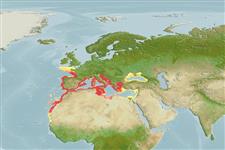Environment: milieu / climate zone / depth range / distribution range
पारिस्थितिकी
समुद्री; खारा; औशिनोड़िरोमस (Ref. 51243); गहराई सीमा 0 - 500 m, usually 5 - 250 m (Ref. 54928). Subtropical; 50°N - 16°N, 20°W - 43°E
Eastern Atlantic: Bay of Biscay to Mauritania including the Mediterranean Sea. The subspecies Trachurus mediterraneus ponticus occurs in the Marmara and Black seas, southern and western parts of the Azov Sea.
Length at first maturity / आकार / वज़न / Age
Maturity: Lm 20.0 range ? - ? cm
Max length : 60.0 cm FL पुल्लिंग / अलिंग; (Ref. 3397); common length : 30.0 cm FL पुल्लिंग / अलिंग; (Ref. 3397)
Adults are found usually near the bottom, at times also in surface waters; pelagic and migratory in large schools. They feed on other fishes especially sardines, anchovies, etc. and small crustaceans (Ref. 4233). Eggs are pelagic (Ref. 4233).
Smith-Vaniz, W.F., 1986. Carangidae. p. 815-844. In P.J.P. Whitehead, M.-L. Bauchot, J.-C. Hureau, J. Nielsen and E. Tortonese (eds.) Fishes of the north-eastern Atlantic and the Mediterranean. UNESCO, Paris. vol. 2. (Ref. 4233)
IUCN Red List Status (Ref. 130435)
Threat to humans
Harmless
Human uses
मात्स्यिकी: व्यापारिक; आखेट मत्स्य: हां
साधन
Special reports
Download XML
इंटरनेट स्रोत
Estimates based on models
Preferred temperature (Ref.
123201): 13.2 - 21, mean 17.4 °C (based on 748 cells).
Phylogenetic diversity index (Ref.
82804): PD
50 = 0.5001 [Uniqueness, from 0.5 = low to 2.0 = high].
Bayesian length-weight: a=0.00891 (0.00773 - 0.01028), b=2.96 (2.93 - 2.99), in cm total length, based on LWR estimates for this species (Ref.
93245).
Trophic level (Ref.
69278): 3.8 ±0.3 se; based on diet studies.
लौटाव (Ref.
120179): माध्यम, न्यूनतम जनसंख्या दुगनी होने का समय 1.4 - 4.4 वर्ष। (K=0.22; tmax=12).
Prior r = 0.51, 95% CL = 0.33 - 0.76, Based on 5 stock assessments.
Fishing Vulnerability (Ref.
59153): Moderate vulnerability (36 of 100).
Climate Vulnerability (Ref.
125649): Moderate to high vulnerability (50 of 100).
Nutrients (Ref.
124155): Calcium = 215 [146, 344] mg/100g; Iron = 3.76 [2.38, 6.28] mg/100g; Protein = 19.8 [19.1, 20.4] %; Omega3 = 0.38 [0.27, 0.54] g/100g; Selenium = 26 [17, 40] μg/100g; VitaminA = 13.8 [3.7, 48.1] μg/100g; Zinc = 1.94 [1.49, 2.61] mg/100g (wet weight); based on
nutrient studies.
